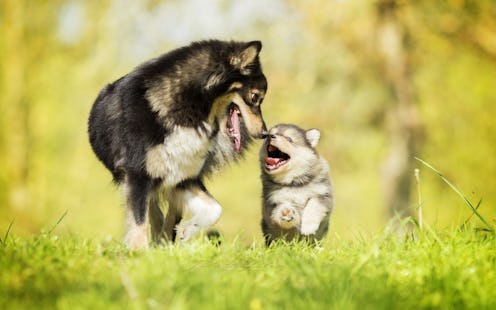
It's easy to assume that two dogs will get along perfectly, because why wouldn't they? They're both, well, dogs. They're the same animal with similar mindsets, so they must be predisposed to becoming best friends, right? Actually — not so much. Think about it: Are two humans destined to get along just because they are both humans? Definitely not, even if they do happen to be very similar. Dogs may not be on the exact same level as humans, but they still have personalities, emotions, and feelings, and they aren't all the same. That means they won't always get along — especially when age is a factor. There are lots of older dogs out there who don't like to be around little puppies, which can make things tricky if you're trying to add a second, younger pup to your home.
Puppies and older dogs are on two different wavelengths: puppies are excited, full of energy, they haven't learned how to communicate properly with other dogs yet, and they're just all over the place. Older dogs, meanwhile, are more established in your home, they have their routine, and they don't want a little pup coming in and messing everything up for them. So, their relationship can get a bit tense sometimes, especially if they are of a breed that doesn't tend to get along with others very well.
If you're adding a puppy to your little family, or plan on doing so in the future, then your best bet is to have dogs that get along with other dogs as well. Here are a few dog breeds that get along with puppies the best:
1German Shepherd
German Shepherds may seem intimidating, but they don't have to be. They're fiercely protective, but very smart and adaptable. When introduced to other dogs, especially when on the younger side, German Shepherds get along with them well. You many not want to introduce a new puppy too late in their life, but generally, German Shepherds will take on a protective role with a pup.
2Basset Hound
Basset hounds are so sweet and low-maintenance that it's almost impossible for them not to get along with other dogs. They're very relaxed and patient, which is a good temperament for a dog to have when hanging out with a puppy.
3Goldendoodle
Goldendoodles are another super sweet breed that get along really well with just about anyone they meet, human or other dog. They're really great family dogs, they're very affectionate and friendly, and they're highly social. They'll likely love a new puppy as if it were their own.
4Collie
Collies are super sweet and they live to please not only their owner, but basically anyone and anything. They're really friendly dogs who get along with everyone, including other, smaller dogs. They don't mind sharing the family love and they are super affectionate and tolerant, which is perfect for a puppy.
5English Foxhound
English foxhounds are actually pack dogs, which means that they're better when surrounded by other dogs than they are when they're on their own. They're super social and get along with other dogs really well, and they are also incredibly active — that means they'll definitely be able to keep up with a puppy.
6Beagle
Beagles are another pack animal that loves to be with other dogs. They are very gentle and friendly, and they make great family dogs, so introducing them to a puppy shouldn't be a problem. They are super curious and they love to explore, so they would probably have fun with a smaller dog.
7Cocker Spaniel
Cocker spaniels have the energy required for being around a puppy. They love to play and they are also really happy, smart, and quite gentle. They make great companions and would love to have the company of a pup around.
8St. Bernard
St. Bernards are like cuddly gentle giants. They might be huge, but they are so loving, calm, and patient, making them perfect for a puppy. They were originally used to find and rescue lost travelers, so they would probably love to take a little puppy under their wing.
9Whippet
Whippets are friendly, happy, relaxed dogs who get along with other dogs really well. They also have enough energy to keep up with a crazy puppy, which they will definitely need!
This article was originally published on